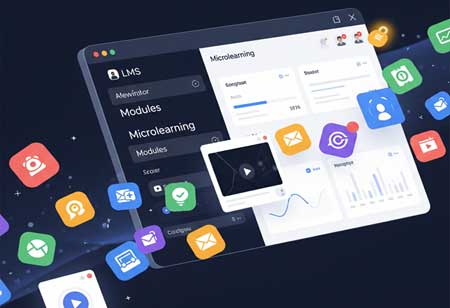THANK YOU FOR SUBSCRIBING
Be first to read the latest tech news, Industry Leader's Insights, and CIO interviews of medium and large enterprises exclusively from Education Technology Insights
The Microlearning Revolution: Reshaping Digital Education One Module at a Time
Microlearning enhances engagement in LMS by delivering bite-sized, focused content, improving retention and flexibility, while facilitating quick course creation and tailored learning experiences for users.

By
Education Technology Insights | Saturday, July 12, 2025
Stay ahead of the industry with exclusive feature stories on the top companies, expert insights and the latest news delivered straight to your inbox. Subscribe today.
Fremont, CA: Today, with attention spans shrinking and information overload rampant, traditional long-form learning content often struggles to keep learners engaged. This is particularly true within Learning Management Systems (LMS) environments, where self-directed learning requires sustained motivation and self-discipline. Enter microlearning modules – bite-sized, focused pieces of content designed for quick consumption and immediate application.
Why Bite-Sized Content Works in LMS Environments
The effectiveness of microlearning significantly boosts engagement by reducing cognitive load. Unlike lengthy courses that can feel overwhelming, concise modules present information in manageable chunks, making it easier for learners to process, understand, and retain the material. This approach encourages consistent interaction and reduces the risk of burnout. Microlearning also aligns with the “spacing effect” in cognitive psychology, which demonstrates that information is better retained when delivered over spaced intervals. By focusing on single objectives per module and allowing learners to revisit concepts over time, microlearning fosters stronger knowledge retention and improves long-term recall.
Flexibility and accessibility also play a crucial role in its effectiveness. Busy professionals and learners with limited study time benefit from the ability to access short modules on various devices—whether during commutes, breaks, or idle moments—seamlessly integrating learning into their daily routines. In addition, microlearning supports just‑in‑time (JIT) learning, providing immediate, targeted information exactly when it is needed. This capability translates directly into enhanced on‑the‑job performance and efficiency.
From a content development perspective, microlearning enables faster and more agile course creation. Instead of investing significant resources into lengthy courses, organizations can develop and update individual modules quickly, an advantage in fast‑evolving industries where accuracy and currency are critical. Moreover, LMS platforms can leverage microlearning to deliver personalized learning paths, recommending modules tailored to individual roles, assessment outcomes, or existing knowledge, ensuring relevance and maximizing impact. The modular structure of microlearning generates rich, granular data, allowing administrators to track engagement, completion rates, and performance at a detailed level. These insights inform continuous improvement, enabling organizations to refine content and address learner needs more effectively.
Implementing Microlearning in LMS
To successfully integrate microlearning into a learning management system (LMS), organizations should adopt a structured and learner-centric approach. Begin by defining clear and concise learning objectives for each micro-module, ensuring that every module focuses on a single concept rather than overwhelming learners with excessive information. Diversify content formats by incorporating videos, infographics, quizzes, and text-based materials to sustain engagement and accommodate different learning preferences. Prioritize a mobile-first design that ensures modules are responsive and easily accessible across various devices, enabling learning on the go. Embed short assessments, such as quizzes or interactive elements, within the modules to reinforce understanding and measure progress.
Additionally, ensure that navigation within the LMS is intuitive, allowing learners to locate and access relevant content easily. Curate and organize modules logically within broader topics or learning paths to create a coherent learning experience. Actively promote the benefits of microlearning to learners, highlighting its flexibility, relevance, and efficiency to encourage adoption and sustained participation.
Microlearning modules are not just a passing trend; they represent a fundamental shift in how effective learning is delivered in the digital age. By embracing bite-sized content, LMS environments can cater to the modern learner's preferences, enhance engagement, improve knowledge retention, and ultimately foster a more efficient and impactful learning experience. As organizations continue to prioritize agile and effective training solutions, microlearning will undoubtedly play an increasingly central role in shaping the future of online education.







